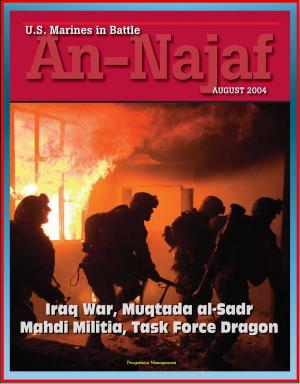Short of General War: Perspectives on the Use of Military Power in the 21st Century - Al-Qaeda, Future of Warfare, Africa Command, Militarization of U.S. Foreign Policy, Counterinsurgency, Iraq
Nonfiction, History, Military, Strategy, United States| Author: | Progressive Management | ISBN: | 9781310542190 |
| Publisher: | Progressive Management | Publication: | March 22, 2016 |
| Imprint: | Smashwords Edition | Language: | English |
| Author: | Progressive Management |
| ISBN: | 9781310542190 |
| Publisher: | Progressive Management |
| Publication: | March 22, 2016 |
| Imprint: | Smashwords Edition |
| Language: | English |
Professionally converted for accurate flowing-text e-book format reproduction, this anthology features perspectives on the use of military power across the spectrum of conflict in the 21st century, short of or following general war, and they provide insights into the necessary force structure, policy, strategy, and doctrinal approaches for future success.
Looking out to 2025, many see the potential for a prolonged period of instability as a result of competing economic models, demographics, the rise of new international actors and the resurgence of old ones, climate change, and the scarcity of resources. The range of stability challenges will stretch the capabilities of any military force structure and require innovative thinking on the part of policymakers and military professionals alike concerning the appropriate development and use of the military element of power.
The first chapter, written by the faculty editor, describes the security dilemma confronting the United States and the implications for military force structure and operations. It argues that full spectrum operations are an appropriate doctrinal response, and that stability operations will present new challenges for the use of military force. The subsequent chapters are a collection of edited student research papers from the U.S. Army War College Class of 2008 selected for their focus on operations short of general war. The editor cast a wide net in search of papers that grasp the implications of the emerging strategic environment, apply strategic level thinking, and offer new and useful ways for the application of military power. Consequently, each of these writings shares in common a worthwhile idea or set of ideas that can materially contribute to how the United States military can best conduct full spectrum operations. Collectively, these essays reveal the innovative thinking, diversity, and depth of thought that is characteristic of the U.S. and foreign military and civilian agency personnel that comprise each class of the U.S. Army War College as they prepare themselves to become senior leaders of their militaries or agencies.
Chapter 1 * Introduction * Dr. Harry R. Yarger * Chapter 2 * Legitimacy in the Conduct of Military Operations * Commander Jonathan P. Wilcox, U.S. Navy * Chapter 3 * Al-Qaeda, the Revolution in Military Affairs, and the Future of Warfare * Lieutenant Colonel Thomas C. Graves, U.S. Army * Chapter 4 * Africa Command and the Militarization of U.S. Foreign Policy * Mr. Dennis R. Penn * Chapter 5 * Strategic Bridge Towards Community Building: The Military's Role * Colonel Lorelei E. W. Coplen, U.S. Army * Chapter 6 * Defining Criteria for Handover to Civilian Officials in Relief Operations * Colonel John Bessler, U.S. Army * Chapter 7 * Economic and Reconstruction Considerations in a Failed State * Colonel Roger H. Westermeyer, U.S. Air Force * Chapter 8 * The Organization for Security and Cooperation in Europe: A Case Study for a Return to Multilateralism * Chapter 9 * Redefining Security Cooperation: New Limits on Phase Zero and "Shaping" * Colonel Thomas M. Rhatican, U.S. Army Reserve * Chapter 10 * Know Before You Go: Improving Army Officer Sociocultural Knowledge * Lieutenant Colonel James C. Laughrey, U.S. Army * Chapter 11 * El Salvador, Iraq, and Strategic Considerations for Counterinsurgency * Chapter 12 * The Use of Security Professionals in Counterinsurgency Operations * Chapter 13 * Influencing the Forgotten Half of the Population in Counterinsurgency Operations * Chapter 14 * The British Approach to Counterinsurgency: Myths, Realities, and Strategic Challenges * Colonel I. A. Rigden OBE, British Army * Chapter 15 * Finding an Exit: Delineating Battle Handoff in Phase IV * Colonel Roger S. Marin, U.S. Army * Chapter 16 * Transitioning from War to Enduring Peace * Chapter 17 * Stability Operations and Government: An Inherently Military Function
Professionally converted for accurate flowing-text e-book format reproduction, this anthology features perspectives on the use of military power across the spectrum of conflict in the 21st century, short of or following general war, and they provide insights into the necessary force structure, policy, strategy, and doctrinal approaches for future success.
Looking out to 2025, many see the potential for a prolonged period of instability as a result of competing economic models, demographics, the rise of new international actors and the resurgence of old ones, climate change, and the scarcity of resources. The range of stability challenges will stretch the capabilities of any military force structure and require innovative thinking on the part of policymakers and military professionals alike concerning the appropriate development and use of the military element of power.
The first chapter, written by the faculty editor, describes the security dilemma confronting the United States and the implications for military force structure and operations. It argues that full spectrum operations are an appropriate doctrinal response, and that stability operations will present new challenges for the use of military force. The subsequent chapters are a collection of edited student research papers from the U.S. Army War College Class of 2008 selected for their focus on operations short of general war. The editor cast a wide net in search of papers that grasp the implications of the emerging strategic environment, apply strategic level thinking, and offer new and useful ways for the application of military power. Consequently, each of these writings shares in common a worthwhile idea or set of ideas that can materially contribute to how the United States military can best conduct full spectrum operations. Collectively, these essays reveal the innovative thinking, diversity, and depth of thought that is characteristic of the U.S. and foreign military and civilian agency personnel that comprise each class of the U.S. Army War College as they prepare themselves to become senior leaders of their militaries or agencies.
Chapter 1 * Introduction * Dr. Harry R. Yarger * Chapter 2 * Legitimacy in the Conduct of Military Operations * Commander Jonathan P. Wilcox, U.S. Navy * Chapter 3 * Al-Qaeda, the Revolution in Military Affairs, and the Future of Warfare * Lieutenant Colonel Thomas C. Graves, U.S. Army * Chapter 4 * Africa Command and the Militarization of U.S. Foreign Policy * Mr. Dennis R. Penn * Chapter 5 * Strategic Bridge Towards Community Building: The Military's Role * Colonel Lorelei E. W. Coplen, U.S. Army * Chapter 6 * Defining Criteria for Handover to Civilian Officials in Relief Operations * Colonel John Bessler, U.S. Army * Chapter 7 * Economic and Reconstruction Considerations in a Failed State * Colonel Roger H. Westermeyer, U.S. Air Force * Chapter 8 * The Organization for Security and Cooperation in Europe: A Case Study for a Return to Multilateralism * Chapter 9 * Redefining Security Cooperation: New Limits on Phase Zero and "Shaping" * Colonel Thomas M. Rhatican, U.S. Army Reserve * Chapter 10 * Know Before You Go: Improving Army Officer Sociocultural Knowledge * Lieutenant Colonel James C. Laughrey, U.S. Army * Chapter 11 * El Salvador, Iraq, and Strategic Considerations for Counterinsurgency * Chapter 12 * The Use of Security Professionals in Counterinsurgency Operations * Chapter 13 * Influencing the Forgotten Half of the Population in Counterinsurgency Operations * Chapter 14 * The British Approach to Counterinsurgency: Myths, Realities, and Strategic Challenges * Colonel I. A. Rigden OBE, British Army * Chapter 15 * Finding an Exit: Delineating Battle Handoff in Phase IV * Colonel Roger S. Marin, U.S. Army * Chapter 16 * Transitioning from War to Enduring Peace * Chapter 17 * Stability Operations and Government: An Inherently Military Function















